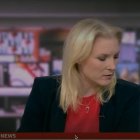The BBC broke its own guidelines 1,500 times in its coverage of the war in Gaza
The report by lawyer Trevor Asserson, and reviewed by The Telegraph, is the latest example of biased coverage by the public media.

Protest against BBC in London
British media outlet BBC violated its own conduct guidelines more than 1,500 times in its coverage of the war between Israel and Hamas, according to a report by lawyer Trevor Asserson, reviewed by The Telegraph.
Television, radio, website, podcasts and social media all were analyzed by investigators over four months, beginning Oct. 7, and they found "a deeply troubling pattern of bias." In numbers, 1,533 violations of their own editorial guidelines such as fairness, accuracy and public interest.
The team of 40 researchers, composed of lawyers and data scientists, found that the BBC associated Israel with genocide more than 14 times as often as Hamas (283 vs. 19). In addition, it frequently portrayed the Jewish state as militaristic and aggressive, while downplaying the Palestinian group's terrorist attacks.
The bias is partly explained, they claim, by those on the media outlet's staff: some local journalists and correspondents who proved sympathetic to the jihadist group. Such as contributor Mayssaa Abdul Khalek, who called for "the death of Israel," or chief correspondent Lyse Doucet, who reportedly downplayed the importance of Black Saturday on several occasions.
The report specifically targets BBC Arabic, the network's Arabic-language station. It identifies eleven occasions on which it used reporters who had made public displays of support for terrorism and Hamas. On none of the occasions was the audience warned.
The report identifies 11 instances in which, it says, BBC Arabic's coverage of the war has featured reporters who had previously made public statements in support of terrorism and, in particular, Hamas, without viewers being informed of this.
Slanted numbers
In addition to linking Israel with the idea of genocide, the BBC also foisted the concepts of "war crimes" (127 times against 30) and "violation of international law" (167 against 27) more than Hamas. The trend was only reversed for "crimes against humanity" (15 for Israel versus 22 for Hamas).
The Telegraph highlights the report's finding that the public broadcaster broke its pledge to describe Hamas as a "proscribed terrorist organization" "whenever possible," a commitment it adopted in response to the wave of criticism for not calling Hamas members "terrorists" after October 7.
However, the researchers found that the terrorist organization was described as such ("proscribed," "designated," or "recognized as...") only 409 out of 12,459 times. That is, 3.2%.
Reactions
According to the Telegraph, the report was delivered to both the network's CEO, Tim Davie, and its chairman, Samir Shah, and all the members of its board of directors. Although the top management has not yet replied, a spokesman quoted by the same media questioned the methodology of the report and questioned its authors for identifying staff members by name and surname.
"The BBC is one of the world's leading news services," Deputy Prime Minister Oliver Dowden recalled and pointed out that such a "severe" downfall of its practices could end up "tarnishing the reputation" of the news service. "Serious questions should be asked as to why this has been allowed to happen."
"Truth is the BBC's bargaining chip in a world of increasing misinformation. If viewers start to believe that there is an agenda beyond its target, they will increasingly question whether the licence fee makes any sense in today's changing media landscape," Conservative MP Julia Lopez opined for her part.
Asserson himself recalled, in similar words, that the public media's responsibility is to "provide unbiased news." "Our analysis reveals a significant departure from this standard," he concluded, adding, "This conduct not only breaches the BBC's Royal Charter, but also calls into question its suitability to continue to receive public funding."
Some examples
Prior to the publication of the report, the BBC had had to correct statements made by its journalists on a number of occasions, in particular for reporting information that turned out to be untrue.
The first occurred less than a month after the start of the war between Israel and Hamas, with journalist Jon Donnison as the protagonist, who speculated about the authorship of an explosion that occurred at the Al Ahli Baptist Hospital.
According to Donnison's report, it was "hard to see what else this could be really given the size of the explosion other than an Israeli air strike or several air strikes." That speculation, which took for granted Hamas's first version that Israel had targeted the health center, was rebuked by the BBC itself.
"We accept that even in this fast-moving situation it was wrong to speculate in this way, although he [Donnision] did not at any point report that it was an Israeli strike. This doesn’t represent the entirety of the BBC’s output, and anyone watching, listening to or reading our coverage can see we have set out both sides’ competing claims about the explosion, clearly showing who is saying them, and what we do or don’t know," the British broadcaster posted on its "corrections and clarifications" page.
Another of the most notable cases took place in November 2023 and was related to false information about an alleged Israeli attack on doctors in Gaza's Al-Shifa hospital. At the time, they argued that the error was due to a misquotation of a Reuters report, although they did acknowledge that the initial report "fell below the editorial standards" of the network.
















